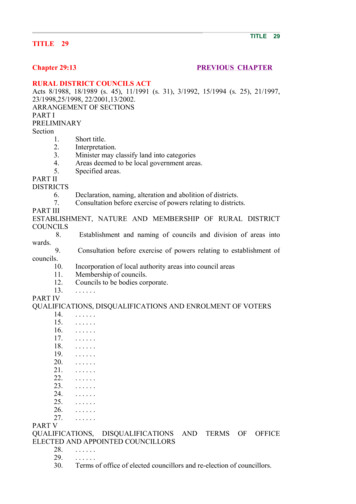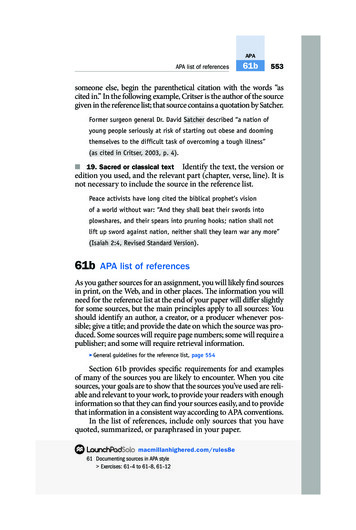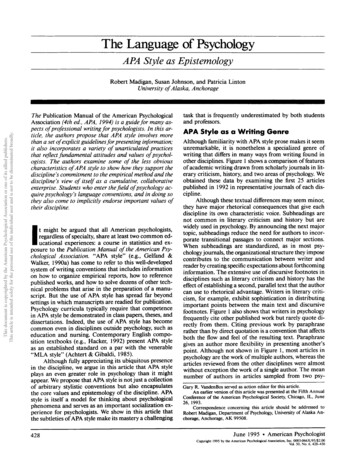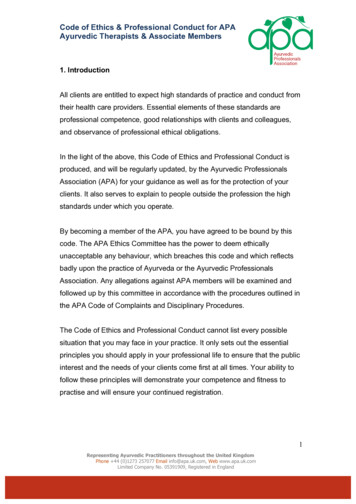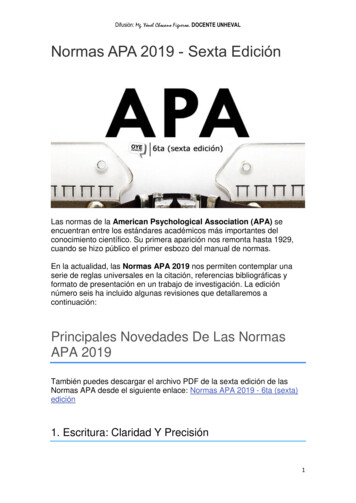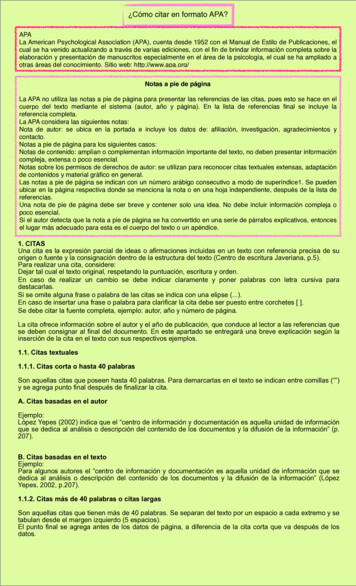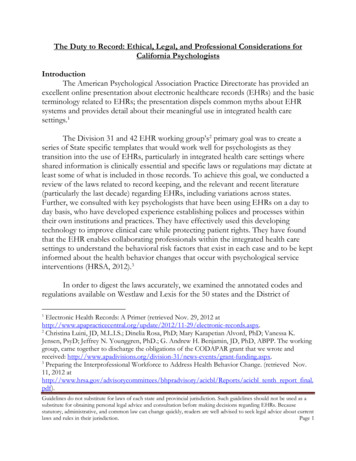
Transcription
The Duty to Record: Ethical, Legal, and Professional Considerations forCalifornia PsychologistsIntroductionThe American Psychological Association Practice Directorate has provided anexcellent online presentation about electronic healthcare records (EHRs) and the basicterminology related to EHRs; the presentation dispels common myths about EHRsystems and provides detail about their meaningful use in integrated health caresettings.1The Division 31 and 42 EHR working group’s2 primary goal was to create aseries of State specific templates that would work well for psychologists as theytransition into the use of EHRs, particularly in integrated health care settings whereshared information is clinically essential and specific laws or regulations may dictate atleast some of what is included in those records. To achieve this goal, we conducted areview of the laws related to record keeping, and the relevant and recent literature(particularly the last decade) regarding EHRs, including variations across states.Further, we consulted with key psychologists that have been using EHRs on a day today basis, who have developed experience establishing polices and processes withintheir own institutions and practices. They have effectively used this developingtechnology to improve clinical care while protecting patient rights. They have foundthat the EHR enables collaborating professionals within the integrated health caresettings to understand the behavioral risk factors that exist in each case and to be keptinformed about the health behavior changes that occur with psychological serviceinterventions (HRSA, 2012).3In order to digest the laws accurately, we examined the annotated codes andregulations available on Westlaw and Lexis for the 50 states and the District of1Electronic Health Records: A Primer (retrieved Nov. 29, 2012 -29/electronic-records.aspx.2Christina Luini, JD, M.L.I.S.; Dinelia Rosa, PhD; Mary Karapetian Alvord, PhD; Vanessa K.Jensen, PsyD; Jeffrey N. Younggren, PhD.; G. Andrew H. Benjamin, JD, PhD, ABPP. The workinggroup, came together to discharge the obligations of the CODAPAR grant that we wrote andreceived: s/grant-funding.aspx.3Preparing the Interprofessional Workforce to Address Health Behavior Change. (retrieved Nov.11, 2012 ory/acicbl/Reports/acicbl tenth report final.pdf).Guidelines do not substitute for laws of each state and provincial jurisdiction. Such guidelines should not be used as asubstitute for obtaining personal legal advice and consultation before making decisions regarding EHRs. Becausestatutory, administrative, and common law can change quickly, readers are well advised to seek legal advice about currentlaws and rules in their jurisdiction.Page 1
Columbia with reference to several relevant state-by-state surveys retrieved from Lexisand Westlaw.4 Our research answered the following questions for each jurisdiction: (a)Do record keeping duties created by statutes or administrative rules exist? (b) Havecourt rulings created a common-law duty or interpreted the statutes or administrativerules? (c) What are the contents of the record that are mandated by law? (d) Are therelaws related to the maintenance and security of records? (e) What are the laws relatedto retention of records? (f) What are the consequences of violating specific duties?Readers should view the narrative summary of their jurisdiction’s law as astarting point for interpreting how to meet the law within their own jurisdiction asthey construct their electronic records. As laws can change, please check the law withyour state associations to see if more current interpretations for meeting the recordkeeping duties. Many state professional associations have ethics committees that canbe consulted as part of their benefits. In addition, your association can referpsychologists for individual consultation to lawyers specializing in legal practicesfocused on mental health practice. The professional liability carriers also provide freelegal and professional consultation.California specific templates for the types and contents of the record areprovided based upon a review of your jurisdiction’s law. The digest of yourjurisdiction’s law should be read if you intend to use the templates.State Specific Template for contents of a recordCalifornia law calls for an intake and evaluation note, and progress notes. Thecontents of the two templates for these documents comply with the law digestedbelow. We believe that a termination note will likely reduce exposure to argumentsabout continued duty of care and reduce the risk of responsibility in a duty toprotect/warn jurisdiction and recommend that psychologists use this template.5Because the documents permit hovering over the underline fields with a cursorto select an option or permit filling in the shaded text boxes, they cannot be inserted450 State Surveys, Legislation & Regulations, Psychologists & Mental Health Facilities (Lexis March2012); Lexis Nexis 50 State Comparative Legislation / Regulations, Medical Records (Lexis June2011); 50 State Statutory Surveys: Healthcare Records and Recordkeeping (Thomson Reuters/ WestOctober 2011).5Benjamin, G. A. H., Kent, L., & Sirikantraporn, S. (2009). Duty to protect statutes. In J. L. Werth,E.R. Welfel, & G. A. H. Benjamin (Eds.), The duty to protect: Ethical, legal, and professional responsibilities ofmental health professionals (pp. 9 – 28). Washington, DC: APA Press. doi:10.1037/11866-002.Guidelines do not substitute for laws of each state and provincial jurisdiction. Such guidelines should not be used as asubstitute for obtaining personal legal advice and consultation before making decisions regarding EHRs. Becausestatutory, administrative, and common law can change quickly, readers are well advised to seek legal advice about currentlaws and rules in their jurisdiction.Page 2
into this document.6 Please access each of the documents on this website, separately.Our group also suggests that users of the templates consider how “behaviormay be shaped by culture, the groups to which one belongs, and culturalstereotypes."7 Whenever “Eurocentric therapeutic and interventions models”8 mayimpair the consideration of multicultural factors among the integrated health careteam members, we urge that psychologists note the factors within the appropriatetemplate fields. In light of the World Health Organization’s demonstratedcommitment to the formulation of a diagnostic system that moves beyond biologicalcausation and integrates the contributions of psychological, cultural, and socialfactors, and APA’s participation in the development of the International Classification ofFunctioning, Disability and Health (World Health Organization, 2010), our grouprecommends using ICD-10 whenever diagnoses are being made.9 The EHR templatespermit drop down diagnoses using the ICD-10 functional diagnoses.Statute or RuleCalifornia has a number of state laws governing record keeping bypsychologists and by health care providers generally. In addition, California hasadopted the standards of the American Psychological Association’s Ethical Principlesof Psychologists and Code of Conduct (2003) (“APA Code of Ethics”).106Please use the most recent version of WORD to access the full capabilities of the EHR templates.American Psychological Association. (2002). Guidelines on Multicultural Education, Training, Research,Practice, and Organizational Change for Psychologists (pp.17-24; p. 11). Washington, DC: y/multicultural-guideline.pdf (last accessed August1, 2012).8Id. at p. 45.9See ICD-10 at 010/en (last accessed August 1,2012); The APA Policy and Planning Board recognized how psychology could move forward byturning to a diagnostic system that was based on the concept of functional impairments (APA Policyand Planning Board, (2005). APA 2020: A perfect vision for psychology: 2004 five-year report of thepolicy and planning board. American Psychologist, 60, 512-522, 518. ve-year-report.pdf ; and APA has helped fundthe creation of the 10th edition in 2008. See, rminutes.aspx (last accessed August 1, 2012)).10CAL. BUS. & PROF. CODE § 2936 (“The board shall establish as its standards of ethical conductrelating to the practice of psychology, the "Ethical Principles and Code of Conduct" published bythe American Psychological Association (APA). Those standards shall be applied by the board as theaccepted standard of care in all licensing examination development and in all board enforcementpolicies and disciplinary case evaluations.”). Copies of the APA Code of Ethics are available from7Guidelines do not substitute for laws of each state and provincial jurisdiction. Such guidelines should not be used as asubstitute for obtaining personal legal advice and consultation before making decisions regarding EHRs. Becausestatutory, administrative, and common law can change quickly, readers are well advised to seek legal advice about currentlaws and rules in their jurisdiction.Page 3
Common LawThere are a number of cases that interpret or refer to California statutesgoverning recordkeeping obligations for California psychologists:Relevant Annotations to California Business and Professions Code § 2936 (adopting theAPA Code of Ethics). The provisions of the Psychology Licensing Law set forth in B & P C §§ 2900et seq. are not unconstitutionally vague as to providing ascertainable standardsfor enactment of rules by the Psychology Examining Committee.Administrative agencies are better qualified to determine and set the standardsof professional conduct in the specific area of their expertise.11Relevant Annotations to California Health and Safety Code §§ 123100, et. seq. (related topatient access to health records). (Unpublished) Plaintiff on his claim against the United States under the FederalTort Claims Act for failure to maintain and produce medical records and failureto answer questions regarding treatment at a Veterans Administration facility,has not shown that the law establishes individual tort liability for emotionaldistress damages related to failure to produce medical records or failure toanswer patient questions.12 A health care practitioner may not refuse inspection and copying or conditionaccess to patient records. Furthermore, the health care provider may not avoidthe mandate of court process by not preparing such a record when the raw datais available to do so. The health care provider must compile and provide theitemized statement in response to a proper discovery request. The burden isupon the health care provider to establish that the compilation would beunduly burdensome or oppressive. The provider had refused to comply withthe insured's request and subsequent deposition subpoena for these documentsAmerican Psychological Association Order Department, 750 First Street, NE, Washington, D.C.20002-4242 and on the APA’s website at http://www.apa.org/ethics/code/principles.pdf (lastaccessed Aug. 1, 2012) [hereinafter “APA CODE OF ETHICS”].11Cooper v. Board of Medical Examiners (1975, Cal App 1st Dist) 49 Cal App 3d 931, 123 Cal Rptr 563,1975 Cal App LEXIS 1266.12Meier v. United States (2009, CA9 Cal) 310 Fed Appx 976, 2009 US App LEXIS 2090, cert den(2009, U.S.) 130 S. Ct. 552, 175 L. Ed. 2d 382, 2009 U.S. LEXIS 7990.Guidelines do not substitute for laws of each state and provincial jurisdiction. Such guidelines should not be used as asubstitute for obtaining personal legal advice and consultation before making decisions regarding EHRs. Becausestatutory, administrative, and common law can change quickly, readers are well advised to seek legal advice about currentlaws and rules in their jurisdiction.Page 4
unless the insured signed a lien for the provider's fees. The provider had nobasis for refusing the insured or his attorney access to those records to whichthe insured had a statutory right. The Legislature has made clear its intent thatevery person should have a right of access to complete medical information (H& S C former §§ 1795, 1795.12, now §§ 123100, 123110; Ev C § 1158). Thediscovery statutes also authorize punishment for refusal to produce documentsrequested in a subpoena (CCP § 2020). 13 In a juvenile proceeding, the prosecutors were properly recused because theycontinued to oppose disclosure of the victim's medical and psychiatric records,even after her father consented. The apparent attempt to represent the victim'sprivacy interest exceeded the exercise of balanced discretion. The prosecutors'constantly shifting grounds of opposition included a motion under H & S C §123115.14Relevant Annotations to California Civil Code §§ 56, et. seq. (regarding the CaliforniaConfidentiality of Medical Information Act): Standards for disclosure of an employee's alcoholism to the employer weregoverned by the Confidentiality of Medical Information Act, CC §§ 56 et seq.,which superseded the general privilege afforded under CC § 47(c). An employeehad sought a leave from work due to a disabling stress-related condition. Thepsychiatrist’s disclosure about the problems being related to alcoholism, withoutthe consent of the employee, gave rise to a claim under the Confidentiality ofMedical Information Act, CC §§ 56 et seq., and the PrivacyClause of Cal Const Art I § 1. 15 It is sound public policy to construe CC § 56.10(c)(14) in a way that will notimpede voluntary reports of suspected misconduct or unfitness by police, reportswhose importance is already recognized and immunized under CC § 47(b)(3).Subdivision 56.10(c)(14) serves as the residuary clause in § 56.10 and legitimizes amyriad of situations the Legislature may not have cared to spell out by establishing13Person v. Farmers Ins. Group of Companies (1997, Cal App 2d Dist) 52 Cal App 4th 813, 61 Cal Rptr2d 30, 1997 Cal App LEXIS 90.14People v. Superior Court (Humberto S.) (2006, Cal App 2d Dist) 145 Cal App 4th 32, 51 Cal Rptr 3d356, 2006 Cal App LEXIS 1841, modified, rehearing denied (2006) 2006 Cal. App. LEXIS 2002,rev'd (2008, Cal) 43 Cal 4th 737, 76 Cal Rptr 3d 276, 182 P 3d 600, 2008 Cal LEXIS 5245.15Pettus v. Cole (1996, Cal App 1st Dist) 49 Cal App 4th 402, 57 Cal Rptr 2d 46, 1996 Cal AppLEXIS 858, rehearing denied Pettus v. Cole (1996, Cal App 1st Dist) 50 Cal App 4th 328B, 1996 CalApp LEXIS 975, review denied Pettus v. Cole (1996, Cal) 1996 Cal LEXIS 7258.Guidelines do not substitute for laws of each state and provincial jurisdiction. Such guidelines should not be used as asubstitute for obtaining personal legal advice and consultation before making decisions regarding EHRs. Becausestatutory, administrative, and common law can change quickly, readers are well advised to seek legal advice about currentlaws and rules in their jurisdiction.Page 5
the principle of permissive disclosure when specifically authorized by law.16 Plaintiffs, through their attorneys, received notice pursuant to CCP § 1985.3, thatdefendant's records of treatment of plaintiffs were being sought pursuant to asubpoena in the wrongful death action and of what they could do to protectagainst unwanted disclosure. Plaintiffs' failure to take any action whatsoever toclaim the psychotherapist-patient privilege constituted a waiver of the privilegewithin the meaning of Ev C § 912(a). Such waiver left defendant in the position ofbeing compelled under the provisions of CC § 56.10(b)(3), to disclose the medicalrecords.17 The trial court did not err in sustaining defendants' demurrer to a medicalmalpractice plaintiff's complaint against a physician, in which plaintiff alleged thatthe physician's disclosure of plaintiff's medical information to an insurer during thecourse of the malpractice litigation violated the Confidentiality of MedicalInformation Act (CC §§ 56 et seq.). Under the act, a health care provider musthold confidential a patient's medical information unless the information fallswithin a statutory exception. The ex parte contact between the physician and theinsurer was contemplated under the exception in CC § 56.10(c)(4), which allows ahealth care provider to disclose medical information without patient authorizationto parties that insure or are responsible for defending professional liability. Thephysician was an associate of the malpractice defendant and was at risk ofmalpractice exposure, and the insurer insured both physicians. Thus, the physicianwas entitled to discuss plaintiff's medical condition with his insurer.18 In a patient's suit against her doctor for allegedly disclosing personal andconfidential medical information about the patient to the patient's employer, thetrial court properly granted the doctor a directed verdict as the information wasnonspecific, CC § 56.16 permitted the doctor to discuss nonspecific informationabout the patient without her consent, and the patient's oral request that thedoctor refrain from conveying any information to her employer did not complywith the statutory prerequisite to nondisclosure.1916Shaddox v. Bertani (2003, Cal App 1st Dist) 110 Cal App 4th 1406, 2 Cal Rptr 3d 808, 2003 Cal AppLEXIS 1167; In light of CAL. CIV. CODE § 56.10, a higher standard of protection may exist forpsychotherapy records.17Inabnit v. Berkson (1988, Cal App 5th Dist) 199 Cal App 3d 1230, 245 Cal Rptr 525, 1988 Cal AppLEXIS 277.18Torres v Superior Court (1990) 221 Cal App 3d 181, 270 Cal Rptr 401, 1990 Cal App LEXIS 626;Province v Center for Women's Health & Family Birth (1990) 20 Cal App 4th 1673, 25 Cal Rptr 2d 667,1993 Cal App LEXIS 1253.) Heller v Norcal Mutual Ins. Co. (1994) 8 Cal 4th 30, 32 Cal Rptr 2d 200,876 P2d 999, 1994 Cal LEXIS 3784.Guidelines do not substitute for laws of each state and provincial jurisdiction. Such guidelines should not be used as asubstitute for obtaining personal legal advice and consultation before making decisions regarding EHRs. Becausestatutory, administrative, and common law can change quickly, readers are well advised to seek legal advice about currentlaws and rules in their jurisdiction.Page 6
A trial court properly found that the health plan's practices of transmitting to itsattorneys medical information concerning plan patients who were either making orcontemplating making medical malpractice claims against the plan were notunlawful and were, in fact, authorized by California's Confidentiality of MedicalInformation Act, CC §§ 56 et seq. Once a patient signals an intention to bring amalpractice claim against a health care provider, the patient cannot reasonablyexpect to keep the details of the professional relationship with the health careprovider a confidential. 20 Former Crim. Code § 56.11(c)(2), impliedly required a minor to authorize a releaseof medical information where the minor lawfully consented to the medicalservices. Nevertheless, the Child Abuse and Neglect Reporting Act (Pen C §§11164 et seq.) unquestionably calls for disclosure, pursuant to Pen C § 11166(a),where there is a reasonable suspicion child abuse has occurred. Thus, to the extentthere may be a conflict between Pen C § 11166, and CC § 56.11(c)(2), Pen C §11166, must prevail on the ground that it is the more specific statute, prescribingthe disclosure of information only where there is a reasonable suspicion childabuse has occurred.21Contents of the record are mandated by lawCalifornia has adopted the APA Code of Ethics22 and the following ethicalstandards create specific record keeping obligations for California psychologists. Inaddition, some aspects of the Health Insurance Portability and Accountability Act(HIPPA)23 would apply to California psychological records when State law does notexist:19Garrett v. Young (2003, Cal App 2d Dist) 109 Cal App 4th 1393, 1 Cal Rptr 3d 134, 2003 Cal AppLEXIS 940; In light of CAL. CIV. CODE § 56.10, a higher standard of protection may exist forpsychotherapy records.20California Consumer Health Care Council v. Kaiser Foundation Health Plan, Inc. (2006, Cal App 1st Dist)142 Cal App 4th 21, 47 Cal Rptr 3d 593, 2006 Cal App LEXIS 1266, review denied (2006) 2006 Cal.LEXIS 13547.21People ex rel. Eichenberger v. Stockton Pregnancy Control Medical Clinic, Inc. (1988, Cal App 3d Dist) 203Cal App 3d 225, 249 Cal Rptr 762, 1988 Cal App LEXIS 724.22APA CODE OF ETHICS, supra note 10.23HIPPA, U.S. Government Printing Office Electronic Code Of Federal Regulations website at:Subpart C--SECURITY STANDARDS FOR THE PROTECTION OF ELECTRONICPROTECTED HEALTH INFORMATION ; Subpart E--PRIVACY OF INDIVIDUALLYIDENTIFIABLE HEALTH INFORMATION (last accessed Aug. 1, 2012).Guidelines do not substitute for laws of each state and provincial jurisdiction. Such guidelines should not be used as asubstitute for obtaining personal legal advice and consultation before making decisions regarding EHRs. Becausestatutory, administrative, and common law can change quickly, readers are well advised to seek legal advice about currentlaws and rules in their jurisdiction.Page 7
3.10 Informed Consent24(a) When psychologists provide assessment, therapy, counseling orconsulting services in person or via electronic transmission or other forms ofcommunication, they obtain the informed consent of the individual orindividuals using language that is reasonably understandable to that person orpersons (See also Standards 9.03, Informed Consent in Assessments;and 10.01, Informed Consent to Therapy.)(b) For persons who are legally incapable of giving informed consent,psychologists nevertheless (1) provide an appropriate explanation, (2) seek theindividual's assent, (3) consider such persons' preferences and best interests,and (4) obtain appropriate permission from a legally authorized person, if suchsubstitute consent is permitted or required by law. When consent by a legallyauthorized person is not permitted or required by law, psychologists takereasonable steps to protect the individual's rights and welfare.(c) When psychological services are court ordered or otherwise mandated,psychologists inform the individual of the nature of the anticipated services,including whether the services are court ordered or mandated and any limits ofconfidentiality, before proceeding.(d) Psychologists appropriately document written or oral consent, permission,and assent. (See also Standards 9.03, Informed Consent in Assessments;and 10.01, Informed Consent to Therapy.)Licensed psychologists are also subject to the provisions of the CaliforniaConfidentiality of Medical Information Act (CCMIA)25 in which disclosures of patient24APA CODE OF ETHICS, supra note 10 § 3.10.CAL. CIV. CODE § 56, et. seq. Under the CCMIA, a “provider of health care" means any personlicensed or certified pursuant to Division 2 (commencing with Section 500) of the Business andProfessions Code . . . and any clinic, health dispensary, or health facility licensed pursuant toDivision 2 (commencing with Section 1200) of the Health and Safety Code. CAL. CIV. CODE §§56.05(j). Psychologists are licensed pursuant to Chapter 6.6. of Division 2 of the Business andProfessions Code. See CAL. BUS. & PROF. CODE §§ 2900, et. seq. Under the CCMIA, “"Medicalinformation" means any individually identifiable information, in electronic or physical form, inpossession of or derived from a provider of health care, health care service plan, pharmaceuticalcompany, or contractor regarding a patient's medical history, mental or physical condition, ortreatment. CAL. CIV. CODE §§ 56.05(g). "Individually identifiable" means that the medical25Guidelines do not substitute for laws of each state and provincial jurisdiction. Such guidelines should not be used as asubstitute for obtaining personal legal advice and consultation before making decisions regarding EHRs. Becausestatutory, administrative, and common law can change quickly, readers are well advised to seek legal advice about currentlaws and rules in their jurisdiction.Page 8
information must occur and the patient should be informed in advance of thelimitations of the record being protected:Authorization for disclosure; When disclosure compelled; Whendisclosure allowed; Prohibitions26(a) No provider of health care shall disclose medical information regarding apatient of the provider of health care or an enrollee or subscriber of a healthcare service plan without first obtaining an authorization, except as provided insubdivision (b) or (c).(b) A provider of health care shall disclose medical information if thedisclosure is compelled by any of the following:(1) By a court pursuant to an order of that court.(2) By a board, commission, or administrative agency for purposes ofadjudication pursuant to its lawful authority.(3) By a party to a proceeding before a court or administrative agencypursuant to a subpoena, subpoena duces tecum, notice to appear servedpursuant to Section 1987 of the Code of Civil Procedure, or any provisionauthorizing discovery in a proceeding before a court or administrativeagency.(4) By a board, commission, or administrative agency pursuant to aninvestigative subpoena issued under Article 2 (commencing with Section11180) of Chapter 2 of Part 1 of Division 3 of Title 2 of the GovernmentCode.(5) By an arbitrator or arbitration panel, when arbitration is lawfullyrequested by either party, pursuant to a subpoena duces tecum issued underSection 1282.6 of the Code of Civil Procedure, or another provisionauthorizing discovery in a proceeding before an arbitrator or arbitrationpanel.(6) By a search warrant lawfully issued to a governmental law enforcementagency.(7) By the patient or the patient's representative pursuant to Chapter 1information includes or contains any element of personal identifying information sufficient to allowidentification of the individual, such as the patient's name, address, electronic mail address,telephone number, or social security number, or other information that, alone or in combinationwith other publicly available information, reveals the individual's identity. Id.26CAL. CIV. CODE § 56.10.Guidelines do not substitute for laws of each state and provincial jurisdiction. Such guidelines should not be used as asubstitute for obtaining personal legal advice and consultation before making decisions regarding EHRs. Becausestatutory, administrative, and common law can change quickly, readers are well advised to seek legal advice about currentlaws and rules in their jurisdiction.Page 9
(commencing with Section 123100) of Part 1 of Division 106 of the Healthand Safety Code.(8) By a coroner, when requested in the course of an investigation by thecoroner's office for the purpose of identifying the decedent or locating nextof kin, or when investigating deaths that may involve public healthconcerns, organ or tissue donation, child abuse, elder abuse, suicides,poisonings, accidents, sudden infant deaths, suspicious deaths, unknowndeaths, or criminal deaths, or when otherwise authorized by the decedent'srepresentative. Medical information requested by the coroner under thisparagraph shall be limited to information regarding the patient who is thedecedent and who is the subject of the investigation and shall be disclosedto the coroner without delay upon request.(9) When otherwise specifically required by law.A HIPPA notice of privacy practices27 that delineates the psychologist’s scope of andlimitations of confidentiality works in tandem with the disclosure document providedto the patient during the informed consent process specified by APA Standards 3.10,9.03, and 10.01. California psychologists should provide specific disclosures about themandatory reporting duties that apply: Duty to report abuse or neglect of a child under age 18;28 Duty to report the abuse, neglect or exploitation of elder or dependentperson;29 Duty to warn and protect by making reasonable efforts to communicate thethreat to the victim or victims and to a law enforcement agency when a clientmakes a serious threat of physical violence against a reasonably identifiablevictim.304.04 Minimizing Intrusions on Privacy31(a) Psychologists include in written and oral reports and consultations, onlyinformation germane to the purpose for which the communication is made.2745 CFR 164.502 (a)(1)(ii) & 45 CFR 164.506 (c); HIPPA, U.S. Government Printing OfficeElectronic Code Of Federal Regulations website at: Subpart E--PRIVACY OF INDIVIDUALLYIDENTIFIABLE HEALTH INFORMATION (last accessed Aug. 1, 2012).28CAL. PENAL CODE § 11164-11174.3.29CAL. WELF. & INST. CODE § 15630(a) – (f).30CAL. CIV. CODE § 43.92.31APA CODE OF ETHICS, supra note 10 § 4.04.Guidelines do not substitute for laws of each state and provincial jurisdiction. Such guidelines should not be used as asubstitute for obtaining personal legal advice and consultation before making decisions regarding EHRs. Becausestatutory, administrative, and common law can change quickly, readers are well advised to seek legal advice about currentlaws and rules in their jurisdiction.Page 10
Standard 4.04(a) suggests that psychologists focus the documentation in a manner thatis very protective of their client’s privacy rights.The following standards set forth in the APA Code of Ethics create specificrecord keeping obligations for California psychologists:6.06 Accuracy in Reports to Payors and Funding Sources32In their reports to payors for services psychologists take reasonable steps toensure the accurate reporting of the nature of the service provided the fees,charges, or payments, and where applicable, the identity of the provider, thefindings, and the diagnosis. (See also Standards 4.01, MaintainingConfidentiality; 4.04, Minimizing Intrusions on Privacy; and 4.05, Disclosures.)9.01 Bases for Assessments33(a) Psychologists base the opinions contained in their rec
California has a number of state laws governing record keeping by psychologists and by health care providers generally. In addition, California has adopted the standards of the American Psychological Association's Ethical Principles of Psychologists and Code of Conduct (2003) ("APA Code of Ethics").10


